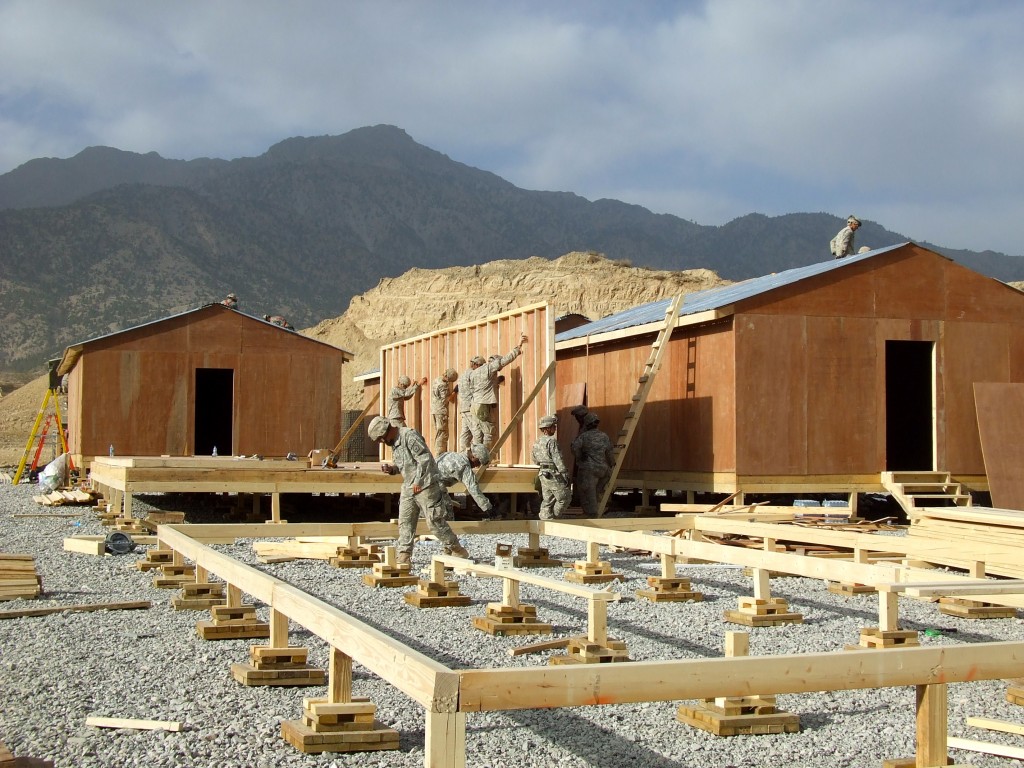
Two minutes before it happened, I was twenty feet in the air, inside the skeleton of a guard tower that overlooked a police compound in southwest Afghanistan. It was a Wednesday in May and the air was damp and laced with the sounds of hammers, electric saws, and fourteen soldiers talking—two in the tower with me, twelve around its base.
I turned my head from side to side, surveying the jobsite for safety violations. I was looking for equipment my soldiers were missing: work gloves, eye protection, neck guards, groin protectors. Equipment that could save them from injury or death in Logar Province.
The guard tower overlooked a dirt field that was sprinkled with scrub and rocks and marred with a ditch that someone had deepened with an excavator to turn into a burn pit. Today, the burn pit was smoldering with napkins, toothpicks, sample size bottles of Tabasco sauce, candy bar wrappers, and scraps of paper—two Army Engineer platoons’ worth of trash. From time to time, Afghani boys arrived from the alleyways of a nearby village. I watched them root through our trash, exclaim in Pashto whenever they extracted something novel, hold their treasures to the sky with caramel-colored hands.
Though I worried about the boys’ proximity to the guard tower, something concerned me more: the hills of Logar Province. They rose up from the dirt field and into the cloud-covered sky. At any moment, I imagined, someone could walk over those hills and start shooting.
I looked back down at my soldiers, twelve of them at work at the base of the guard tower, searching, again, for safety violations.
And then I heard it. Specialist Camacho yelled it from the base of the tower. “Look out. It’s coming.”
I snapped my head up to the hills. And I saw it: the swell of brown, like a sheet of rain, thick, pluming forward. Dust storm.
All season I’d watched the bodies of dust devils twist across the field, gaining momentum as they drove into ridges, losing momentum as they came up the other side. But they’d always seemed to be fragile, far-off things, never this monstrous, and never this close.
It was too late to seek refuge in a tent, or a porta-potty, or a concrete building. Instinctively, the three of us in the tower dropped to our butts, leaned against the plywood walls, and covered our mouths and noses. Down below, twelve soldiers did the same; the hammers, electric saws, and voices cut out. My face was turned away from the dust plume and the only indication of its approach was a low rush of wind. I silently counted the seconds to impact: one one thousand, two one thousand, three one thousand, four.
Time stalled as the dust blew through the tower, swirling and seeping, saturating every step, surface, and knothole. Through squinted eyes I surveyed the orange-brown landscape. Days later, I’d think about how the dust made it look like the sepia-toned photographs of oxen and covered wagons and women in high-necked dresses that I used to study in American history books.
And I’d think about how vulnerable we were, at that very moment, to anything that may have been lurking on the other side of the hills.
After a few moments the wind propelled the dust away, toward the police compound and nearby village. Opening our eyes and uncovering our mouths and noses, we laughed at each other’s faces—our lips, cheeks, and necks the color of rawhide. We took off our sunglasses and laughed harder at the racoonish contrast of skin around our eyes. We patted down our ballistic vests and the sleeves and legs of our Army Combat Uniforms and watched the dust mushroom off, dissolving in the pale sunlight.
***
That night, standing in a concrete shower in the police compound, the dirt ran off my skin like ink stains and swirled down the drain. I kept showering until the water ran clear. Despite my intentions, I found dust on my body for days after the storm. I tried to extract it with Q-tips, a hairbrush, and dental floss. Still I kept finding it for months—a reminder even now of all the tangible and intangible things I gained and lost and never recovered—deep in my scalp and ears and armpits, wedged in the crevices between my toes and teeth.
